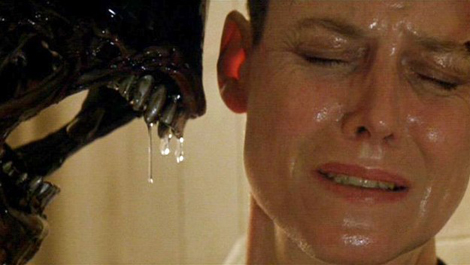Is It Just Me... Or Is Alien 3 Really A Misunderstood Masterpiece?
David Fincher's Alien sequel is a modern classic

Alien 3 is now 20 years old. Two decades.
If, like me, you’re of mid-’80s vintage, it probably doesn’t feel ‘old’ at all.
Scott and Cameron’s efforts are firmly in a pre-’90s, pre-memory past, but I do remember the seven-year-old me being far too terrified by Alien 3 ’s poster to even want to see it.
I definitely remember the awesome tie-in SNES game. And I even remember the fuss about how terrible the thing was, the thermonuclear intensity of which was powerful enough to distract me from watching Wacaday , or whatever else I was doing back then.
But what was all the fuss about?
Looked at today, there’s not much wrong with Alien 3 , and there’s a huge amount that’s right about it.
In fact, it’s a very solid film indeed – a weird kind of modern classic – and it established the themes that would underpin David Fincher’s career so far.
Bringing all the latest movie news, features, and reviews to your inbox
First things first – it’s important to realise what we’re dealing with. Alien 3 is not an adrenaline-spiker like Alien or Aliens .
In fact, it falls down when it tries to compete on that level – the endless foundry chase is just confusing, rather than exhilarating.
For all their auteurist dressings, the first two films were still genre outings with top-notch skills applied.
Fincher may have overreached in trying to sidestep the alien-as-threat staple in favour of the alien-as-metaphor idea. But we need to realise that was exactly his intention.
True, 20th Century Fox isn’t known to toss tens of millions of dollars at intense twentysomethings for them to explore their own dark impulses. Hence the film’s legendarily friction-filled production, and the bad buzz that doomed it before it had even opened.
But was all this fair?
Well, expectations were raised for a monster movie, and expectations were delivered to the letter of the law, but not its spirit.
Because Alien 3 is just not a creature feature – it’s a film about death.
Not only that, it’s a film about confronting and accepting death, and what can be achieved when that happens.
To my mind, it reaches depths that most Palme d’Or-chasing pretenders never manage.
Think about it. Every plan Ripley and the prison-planet inmates put into action makes the situation worse. (In the 2003 workprint, even an early triumph is undercut by human frailty.)
Once Ripley clocks she is carrying a chestburster, she attempts suicide by alien (and how good is Sigourney in that scene?).
This fails, and it becomes clear that when the movie’s real baddie – The Company – arrives, they will kill anybody left standing by the alien.
The prisoners despair, but eventually decide it’s better to go out fighting on their feet. They die both ways, but at least there is dignity and freedom in their attempts to take down the alien before they kick the bucket.
For me, the result is nothing less than the kind of exercise in existentialism novelist Albert Camus might have made if he’d gone into horror flicks.
Alien 3 services its thematic weight with technical excellence and a handful of top- notch performances.
So, for all its defiant lack of fan-pleasing and occasional moments where executives’ scissors are visible, it’s genuinely a misunderstood masterpiece. Or is it just me?


